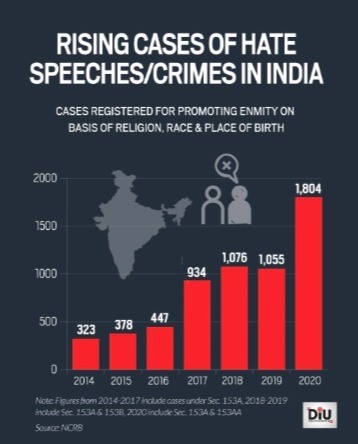26 Apr. 24: In its latest report titled ‘Hate Crime Tracker’, the Association for Protection of Civil Rights (APCR) revealed alarming statistics regarding hate crimes and hate speech in India. The report, released recently, documents a total of 56 instances in January this year, comprising 39 hate crimes and 17 incidents of hate speech. Shockingly, 95.5% of the victims recorded were from the Muslim community, with the remaining 4.5% identified as Christians.
The report sheds light on the grim reality despite assurances of inclusivity from Prime Minister Narendra Modi, with crimes against religious minorities persisting in India. Hate crimes were predominantly categorized as mob violence (39.3%), attacks on property (23%), and physical assault (21.3%). Other recorded incidents include intimidation/harassment (9.8%), sexual violence (4.9%), and violence causing death (1.6%).
Political leaders accounted for the majority of hate speeches (33.3%), followed by religious leaders (10%). Madhya Pradesh recorded the highest rate of hate crimes and hate speech at 25.4%, followed by Uttar Pradesh (22.03%) and Maharashtra (20.3%).
The report defines hate crime as a criminal act motivated by hostility and prejudice against an individual based on their race, religion, or other personal traits. Similarly, hate speech is identified as language promoting violence or hatred against certain groups or individuals.
The APCR report juxtaposes Prime Minister Narendra Modi’s message of peace and harmony during the consecration ceremony of Ram Mandir in Ayodhya with the ground reality. It highlights instances of communal violence and provocations in various Indian states despite claims of peaceful celebrations.
Moreover, the report criticizes the lack of official recognition and accountability for hate crimes and speeches by the Indian government. It underscores the need for data collection and accountability mechanisms to address these pervasive issues effectively.
The efforts of APCR to fill the void in data collection and accountability are commendable, given the state’s complacency and lack of substantial action. The report emphasizes the urgent need to protect the rights of vulnerable groups and combat impunity effectively.




